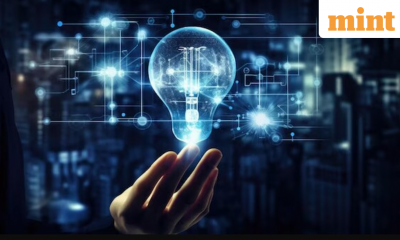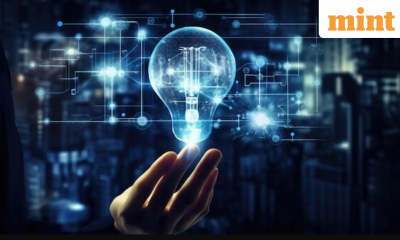

Metaverse
Generative AI could radically alter the practice of law – Crypto News
Lawyers are a conservative bunch, befitting a profession that rewards preparedness, sagacity and respect for precedent. No doubt many enjoyed a chuckle at the tale of Steven Schwartz, a personal-injury lawyer at the New York firm Levidow, Levidow & Oberman, who last month used Chat GPT to help him prepare a court filing. He relied a bit too heavily on the artificial-intelligence (AI) chatbot. It created a motion replete with made-up cases, rulings and quotes, which Mr Schwartz promptly filed after the bot assured him that the “cases I provided are real and can be found in reputable legal databases” (they were not, and cannot) Lesson learned, a tech-sceptic lawyer might conclude: the old ways are the best.
That is the wrong lesson. Blaming AI for Mr Schwartz’s error-filled brief makes no more sense than blaming the printing press for mistakes in a typed one. In both cases, the fault lies with the lawyer who failed to check the motion before filing it, not the tool that helped produce it. For that is what AI is: neither a fad nor an apocalypse, but a tool in its infancy. And one that could radically change how lawyers work and law firms make money. The legal profession is hardly the only field about which one could say that. But few combine as clear a use case with so high a risk. Firms that get it right stand to reap the rewards. Laggards risk going the way of typesetters.
According to Goldman Sachs, a bank, 44% of legal tasks could be performed by AI, more than any occupation surveyed except for clerical and administrative support. Lawyers spend an awful lot of time scrutinizing tedious documents—the sort of thing AI has already shown it does well. Lawyers use AI for a variety of tasks, including due diligence, research and data analytics. These applications have largely relied on “extractive” AI, which, as the name suggests, extracts information from a text, answering specific questions about its contents.
“Generative” AIs such as ChatGPT are far more powerful. Part of that power can be used to improve legal research and document review. As Pablo Arredondo, creator of a generative-AI “legal assistant” called CoCounsel explains, using it “removes the tyranny of the keyword…It can tell that ‘We reverse Jenkins’ [a fictional legal case] and ‘We regretfully consign Jenkins to the dustbin of history’ are the same thing.” Allen & Overy, a large firm based in London, has integrated a legal AI tool called Harvey into its practice, using it for contract analysis, due diligence and Litigation prep.
Not all lawyers are convinced. One recent survey found that 82% of them believe generative AI can be used for legal work but just 51% thought it should. Many worry about “hallucinations” (as AI boffins refer to chatbots’ tendency to present falsehoods with aplomb, as in Mr Schwartz’s case) and about inadvertently feeding information subject to attorney-client privilege into algorithms. Yet if these challenges can be tackled—and they can, with better technology and careful humans in the loop—then the misgivings of the doubting 49% may pass. After news of Mr Schwartz’s debacle broke, for example, a federal judge in Texas told attorneys appearing before him to file a certificate attesting they did not use generative AI or checked the final result before filing anything. Much as it made little sense for lawyers to insist on doing legal research in libraries once the vastly larger and more easily searched databases of Westlaw and LexisNexis were a click away, when A critical mass of firms embraces generative AI, more will follow.
AI has the potential to transform the legal profession in three big ways. First, it could reduce big firms’ manpower advantage. In large, complex lawsuits, these firms tell dozens of associates to read millions of pages of documents looking for answers to senior lawyers’ questions and hunches. Now a single lawyer or small firm will be able to upload these documents into a litigation-prep AI and begin querying them. As Lawrence Lessig of Harvard Law School notes, “You can be a smaller, leaner specialized firm and have the capacity to process these sorts of cases.”
Second, AI could change how firms make money. Richard Susskind, technology advisor to the Lord Chief Justice of England, argues that firms profit by “having armies of young lawyers to whom they pay less than they charge clients”. If AI can do the work of those armies in seconds, firms will need to change their billing practices. Some may move to charging flat fees based on the service provided, rather than for the amount of time spent providing it. Stephen Wu of Silicon Valley Law Group speculates that firms may charge “a technology fee”, so that “clients don’t expect to get generative AI for nothing”.
Third, AI could change how many lawyers exist and where they work. Eventually, Mr Lessig argues, it is hard to see how AI “doesn’t dramatically reduce the number of lawyers the world needs”. If AI can do in 20 seconds a task that would have taken a dozen associates 50 hours each, then why Would big firms continue hiring dozens of associates? A veteran partner at a prestigious corporate-law firm in New York expects the ratio of associates to partners to decline from today’s average of perhaps seven to one at the top firms closer to parity. ‘t worried about their jobs, he says, “they should be”.
That may not happen for a while, though. And in the near term, AI could make legal services cheaper, particularly for small and medium-sized businesses that currently struggle to afford them. Ambitious law-school graduates may find AI provides an easier path to starting a solo practice. If so, then AI could lead to an increase in the overall number of lawyers in the near term, as well as changing the sort of work they do—just as the ATM led to an increase in the number of human bank tellers rather than their replacement.
Ultimately this will be good news for clients. “People who go to lawyers don’t want lawyers: they want resolutions to their problems or the avoidance of problems altogether,” explains Mr Susskind. If AI can provide those outcomes then people will use AI. Many people already use software to do their taxes rather than rely on professionals; “Very few of them are complaining about the lack of social interaction with their tax advisers.”
© 2023, The Economist Newspaper Limited. All rights reserved. From The Economist, published under license. The original content can be found on www.economist.com
Catch all the business news, market news, breaking news Events and Latest News Updates on Live Mint. Download Mint News App to get Daily Market Updates.
Updated: 07 Jun 2023, 03:01 PM IST
-
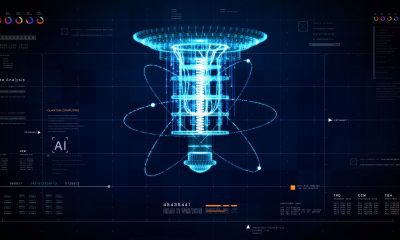
 Blockchain1 week ago
Blockchain1 week agoThe Quantum Clock Is Ticking on Blockchain Security – Crypto News
-

 Technology1 week ago
Technology1 week agoHow Americans are using AI at work, according to a new Gallup poll – Crypto News
-

 Technology1 week ago
Technology1 week agoHow Americans are using AI at work, according to a new Gallup poll – Crypto News
-

 Blockchain1 week ago
Blockchain1 week agoTether Launches Dollar-Backed Stablecoin USAT – Crypto News
-
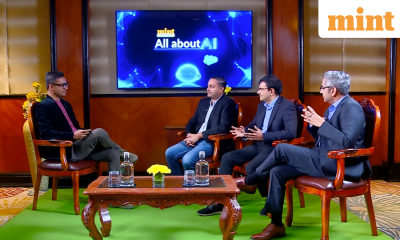
 Metaverse4 days ago
Metaverse4 days agoContext engineering and the Future of AI-powered business – Crypto News
-

 Cryptocurrency1 week ago
Cryptocurrency1 week agoRiver Crypto Token Up 1,900% in the Last Month—What’s the Deal? – Crypto News
-

 Metaverse4 days ago
Metaverse4 days agoStop panicking about AI. Start preparing – Crypto News
-

 Blockchain1 week ago
Blockchain1 week agoTrump-Backed WLFI Snaps Up 2,868 ETH, Sells $8M WBTC – Crypto News
-

 Blockchain1 week ago
Blockchain1 week agoTrump-Backed WLFI Snaps Up 2,868 ETH, Sells $8M WBTC – Crypto News
-

 Blockchain1 week ago
Blockchain1 week agoUS Storm Smashes Bitcoin Mining Power, Sending Hash Rates Tumbling – Crypto News
-

 Metaverse1 week ago
Metaverse1 week agoIs AI eating up jobs in UK? New report paints bleak picture – Crypto News
-

 Cryptocurrency1 week ago
Cryptocurrency1 week agoTrump family-backed American Bitcoin achieves 116% BTC yield – Crypto News
-

 Cryptocurrency1 week ago
Cryptocurrency1 week agoRiver price defies market downturn, explodes 40% to new ATH – Crypto News
-
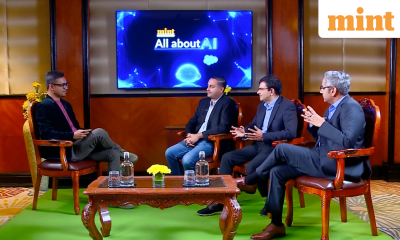
 Metaverse4 days ago
Metaverse4 days agoContext engineering and the Future of AI-powered business – Crypto News
-

 Metaverse4 days ago
Metaverse4 days agoContext engineering and the Future of AI-powered business – Crypto News
-

 Blockchain1 week ago
Blockchain1 week agoBitcoin Gets the Macro Bug as $87,000 Comes Into Play – Crypto News
-

 Cryptocurrency1 week ago
Cryptocurrency1 week agoMakinaFi hit by $4.1M Ethereum hack as MEV tactics suspected – Crypto News
-

 Technology1 week ago
Technology1 week agoHow Americans are using AI at work, according to a new Gallup poll – Crypto News
-

 others1 week ago
others1 week agoPBOC sets USD/CNY reference rate at 6.9843 vs. 6.9929 previous – Crypto News
-

 Blockchain1 week ago
Blockchain1 week agoKalshi Expands Political Footprint with DC Office, Democratic Hire – Crypto News
-

 Technology1 week ago
Technology1 week agoElon Musk says ‘WhatsApp is not secure’ amid Meta privacy lawsuit; Sridhar Vembu cites ‘conflict of interest’ – Crypto News
-

 Blockchain1 week ago
Blockchain1 week agoBitcoin Gets the Macro Bug as $87,000 Comes Into Play – Crypto News
-
Business1 week ago
Bitcoin and XRP Price At Risk As US Govt. Shutdown Odds Reach 73% – Crypto News
-
Business1 week ago
Bitcoin and XRP Price At Risk As US Govt. Shutdown Odds Reach 73% – Crypto News
-
Business1 week ago
Bitcoin Sentiment Weakens BTC ETFs Lose $103M- Is A Crash Imminent? – Crypto News
-
Business1 week ago
Japan Set to Launch First Crypto ETFs as Early as 2028: Nikkei – Crypto News
-

 Cryptocurrency1 week ago
Cryptocurrency1 week agoRYO Digital Announces 2025 Year-End Milestones Across Its Ecosystem – Crypto News
-

 Cryptocurrency1 week ago
Cryptocurrency1 week agoRiver Crypto Token Up 1,900% in the Last Month—What’s the Deal? – Crypto News
-
Business1 week ago
Experts Advise Caution As Crypto Market Heads Into A Bearish Week Ahead – Crypto News
-
Business1 week ago
Experts Advise Caution As Crypto Market Heads Into A Bearish Week Ahead – Crypto News
-

 Blockchain1 week ago
Blockchain1 week ago‘Most Reliable’ Bitcoin Price Signal Hints at a 2026 Bull Run – Crypto News
-
Technology1 week ago
Bitcoin And XRP Price Prediction Ahead of FOMC Meeting Tomorrow, Jan 28 – Crypto News
-
Technology1 week ago
Bitcoin And XRP Price Prediction Ahead of FOMC Meeting Tomorrow, Jan 28 – Crypto News
-
Technology1 week ago
Bitcoin And XRP Price Prediction Ahead of FOMC Meeting Tomorrow, Jan 28 – Crypto News
-
Business1 week ago
Bitcoin Faces Renewed Volatility as Investors Explore Options Like Everlight – Crypto News
-
others1 week ago
Jerome Powell Speech Tomorrow: What to Expect From Fed Meeting for Crypto Market? – Crypto News
-

 others1 week ago
others1 week agoMichael Saylor’s Strategy Buys Another $264,100,000 in Bitcoin (BTC) Amid Crypto Market Downturn – Crypto News
-
Technology2 days ago
Fed Rate Cut Uncertainty Mounts as BLS Delays Jobs Report Amid Shutdown – Crypto News
-
Business1 week ago
Bitcoin and XRP Price At Risk As US Govt. Shutdown Odds Reach 73% – Crypto News
-
others1 week ago
U.S. Shutdown Odds Hit 78% as CLARITY Act Faces Fresh Uncertainty – Crypto News
-

 others1 week ago
others1 week ago478,188 Americans Warned After Hackers Strike Government-Related Firm Handling Sensitive Personal Data – Crypto News
-
Technology1 week ago
Crypto Events to Watch This Week: Is the Market Entering a New Recovery Phase? – Crypto News
-

 Blockchain1 week ago
Blockchain1 week agoCZ Won’t Return to Binance, Bullish on Bitcoin Supercycle – Crypto News
-

 Blockchain1 week ago
Blockchain1 week agoSolana (SOL) Slips Further As Bears Target Deeper Support Zones – Crypto News
-

 Technology1 week ago
Technology1 week agoIs TikTok still down in the United States? Check current status – Crypto News
-

 Cryptocurrency1 week ago
Cryptocurrency1 week agoThe productivity bull case for almost everything – Crypto News
-
Business1 week ago
Experts Advise Caution As Crypto Market Heads Into A Bearish Week Ahead – Crypto News
-
Technology1 week ago
Bitcoin And XRP Price Prediction Ahead of FOMC Meeting Tomorrow, Jan 28 – Crypto News
-

 Cryptocurrency1 week ago
Cryptocurrency1 week agoHyperliquid explained: The $3 trillion DEX that’s shaking up crypto trading – Crypto News
-
Cryptocurrency1 week ago
Pi Network Price Prediction as 134M Token Unlock in Jan 2026 Could Mark a New All-Time Low – Crypto News

